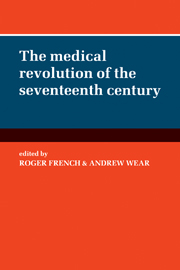Book contents
- Frontmatter
- Contents
- List of contributors
- Acknowledgements
- Introduction
- 1 Medicine, religion and the puritan revolution
- 2 Harvey in Holland: circulation and the Calvinists
- 3 The matter of souls: medical theory and theology in seventeenth-century England
- 4 Mental illness, magical medicine and the Devil in northern England, 1650–1700
- 5 Passions and the ghost in the machine: or what not to ask about science in seventeenth- and eighteenth-century Germany
- 6 Thomas Sydenham: epidemics, experiment and the ‘Good Old Cause’
- 7 The medico-religious universe of an early eighteenth-century Parisian doctor: the case of Philippe Hecquet
- 8 Isaac Newton, George Cheyne and the Principia Medicinae
- 9 Physicians and the new philosophy: Henry Stubbe and the virtuosi-physicians
- 10 The early Royal Society and the spread of medical knowledge
- 11 Medical practice in late seventeenth-and early eighteenth-century England: continuity and union
- Index
1 - Medicine, religion and the puritan revolution
Published online by Cambridge University Press: 05 January 2012
- Frontmatter
- Contents
- List of contributors
- Acknowledgements
- Introduction
- 1 Medicine, religion and the puritan revolution
- 2 Harvey in Holland: circulation and the Calvinists
- 3 The matter of souls: medical theory and theology in seventeenth-century England
- 4 Mental illness, magical medicine and the Devil in northern England, 1650–1700
- 5 Passions and the ghost in the machine: or what not to ask about science in seventeenth- and eighteenth-century Germany
- 6 Thomas Sydenham: epidemics, experiment and the ‘Good Old Cause’
- 7 The medico-religious universe of an early eighteenth-century Parisian doctor: the case of Philippe Hecquet
- 8 Isaac Newton, George Cheyne and the Principia Medicinae
- 9 Physicians and the new philosophy: Henry Stubbe and the virtuosi-physicians
- 10 The early Royal Society and the spread of medical knowledge
- 11 Medical practice in late seventeenth-and early eighteenth-century England: continuity and union
- Index
Summary
INTRODUCTION
The first major critique of orthodox medical practice in England was composed as early as 1585 by the Paracelsian, Richard Bostocke, yet no attempt to implement a programme of medical reform took place until the 1650s – the years of the so-called ‘puritan revolution’. Not surprisingly, many historians have for some time assumed that the well-documented opposition to medical orthodoxy in the middle decades of the seventeenth century must have been related to some extent to the political and religious upheavals of these years. In particular, it has become widely accepted that the beliefs and values associated with the puritan movement were largely responsible for the promotion of reform, not just in medicine and natural science, but in all aspects of early modern English society. In the words of R.F. Jones, ‘the Puritans were out to reform not only Church and State in their narrow connotations, but almost everything else’.
Since Jones's statement, the ‘puritanism–science hypothesis’ has undergone numerous refinements and, in the process, attracted large numbers of adherents. In particular, the work of Christopher Hill has established beyond reasonable doubt the vogue for new attitudes to science and medicine in revolutionary England, and in 1975 Charles Webster published what is certainly the most thorough and persuasive account to date of the ‘puritanism–science’ connection in The Great Instauration.
- Type
- Chapter
- Information
- The Medical Revolution of the Seventeenth Century , pp. 10 - 45Publisher: Cambridge University PressPrint publication year: 1989
- 7
- Cited by

